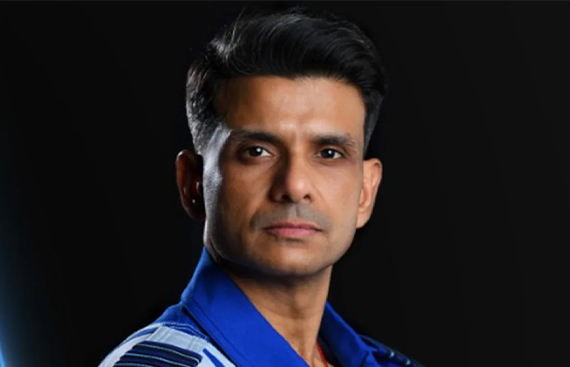Indian Astronaut Shubhanshu Shukla to Launch from Iconic Pad 39A
By
siliconindia | Thursday, 15 May 2025, 11:51:38 AM IST

- Indian astronaut Group Captain Shubhanshu Shukla is set to fly to space from Launch Complex 39A at NASA’s Kennedy Space Center, the same site from where Neil Armstrong launched in 1969.
- Shukla will be the Mission Pilot for Axiom Mission 4 (Ax-4), a private spaceflight organized by Axiom Space, in collaboration with NASA and ISRO.
- The mission is now scheduled for no earlier than June 8, 2025, at 6:41 PM IST, postponed from the earlier planned date of May 29, 2025.
Group Captain Shubhanshu Shukla, a decorated Indian Air Force pilot and astronaut-designate, is poised to make history as only the second Indian to fly into space. His mission will blast off from the legendary Launch Complex 39A at NASA's Kennedy Space Center in Florida the same launch complex that Neil Armstrong used on his historic mission to the Moon aboard Apollo 11 in 1969.
Although Shukla will not be going to the Moon, his mission represents a historic leap for India's human spaceflight ambitions. As the pilot of Axiom Mission 4 (Ax-4), a private astronaut mission arranged by U.S.-based company Axiom Space, he will spend a maximum of 14 days on board the International Space Station (ISS). Throughout the mission, he will perform a set of experiments and activities in agriculture, food, and human biology.
The mission was originally set to launch 'no earlier than May 29, 2025', but has now been delayed to 'no earlier than Sunday, June 8, 2025, at 6:41 PM IST'. Axiom Space announced the delay after NASA and its ISS partners made scheduling changes, due to requirements to more closely coordinate visiting spacecraft logistics and provide ample time for final mission preparations. Schedules for human spaceflights normally face such delays because of the utmost importance of complete system readiness and assurance of safety.
While ISRO has a tendency to give particular launch dates and times, NASA and its collaborators have a practice of using the term 'no earlier than' in order to have scheduling leeway in case of delays. This conservative practice is especially required in manned flights, wherein even a small risk can have disastrous outcomes.
Group Captain Rakesh Shukla, with the call sign 'Shux', was chosen under ISRO's Human Spaceflight Programme (HSP) and is one of India's leading contenders for the country's first indigenously designed crewed spaceflight mission Gaganyaan. His ride on Ax-4 will provide him with irreplaceable training and experience of live spaceflight operations, adaptation to microgravity, launch and recovery procedures, and emergency drills, all of which will translate directly into India's Gaganyaan planning.
The mission, which is being jointly executed by NASA, ISRO, and Axiom Space, is going to cost approximately Rs 550 crores, according to an affirmation given by ISRO Chairman Dr. V. Narayanan. He also showed utmost faith in Shukla's capability to successfully conduct the mission, highlighting the tremendous expectations India has from this mission.
Joining Group Captain Shukla on the flight will be Peggy Whitson, a veteran retired NASA astronaut and mission commander; Slawosz Uznanski-Wisniewski of Poland; and Tibor Kapu of Hungary. After arriving at the ISS, the Ax-4 crew will conduct science outreach and commercial tasks for up to two weeks.
Group Captain Shukla has already achieved high levels of recognition in India's aerospace establishment. A highly respected test pilot with the Indian Air Force, he comes with an excellent track record of operational success. His mission is viewed as a vital stepping stone for his own career, as well as for India's overall intentions in the field of space.
As a precautionary measure against any last-minute contingencies, India has appointed Group Captain Prasanth Balakrishnan Nair as a stand-by astronaut for the mission. This provides mission continuity and proves the expanding number of trained Indian astronauts available for future global and national space missions.
Also Read More: How GCCs Are Quietly Powering Global Tech Strategy
Minister of State for Science and Technology Jitendra Singh recently addressed the strategic significance of this mission, saying, 'India is ready for its next space milestone'. He emphasized that such global collaborations and the momentum of flagship projects such as Gaganyaan reflect India's resolve to become a global leader in space technology. Such missions are not merely milestones in science advancement but also central to India's vision of an independent and developed future.
Prime Minister Narendra Modi has also laid down India's ambitious long-term space exploration goals, such as building the 'Bharatiya Antariksha Station' by 2035 and sending an Indian astronaut to the Moon by 2040.
Group Captain Shukla's flight, thus, has symbolic and strategic significance. Though he might not say Neil Armstrong's famous words, his space journey could well be enshrined as 'one small step for ISRO, one giant leap for Bharat'. As he gets ready to take off from the same launch site that created history more than half a century ago, the country holds its breath with pride and expectation for its next giant leap into the universe.
Read More News :
Centre Sends Notices to e-Commerce Giants for Selling Pakistani Flags, Merchandise
Meta Expands India Head Sandhya Devanathan's Role to Include Southeast Asia


.jpg)
